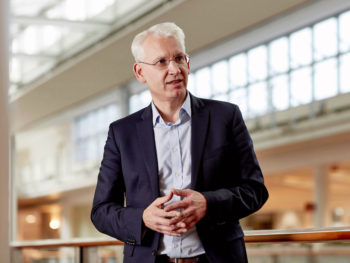Comment: Driving the future – the role of clean transport in clearing the air
Michael Lewis, E.ON UK chief executive, on how industry and local, regional and national governments need to work together to tackle toxic air in our towns and cities.
Whether it’s the global climate emergency or the more local issue of air quality and the effect on our nation’s health, it goes without saying that transport – and, by extension, fleet professionals – have a crucial part to play.
Commercial transport is, pun intended, one of the key drivers of any economy; businesses and communities simply don’t function without the timely and efficient flow of goods and people. The downside is the potential for delays, congestion, pollution.
The number of delivery vans on the road has increased by 59% since 2000 and it is vital for British businesses to stay ahead of the rising costs and environmental legislative requirements of their delivery fleets. Going greener doesn’t just make environmental sense, but it is a sound commercial decision, too: cutting emissions can help create customer loyalty, with more consumers than ever choosing a brand based on the sustainability of their operations.
Sustainable transport may not always feel like a strategic imperative in business (despite transport being the UK’s second highest emitter of greenhouse gases) especially among those businesses without significant direct transport or fleet infrastructures. Company cars, for example, can often be neglected as “someone else’s problem”.
But from an environmental and clean air point of view – Public Health England (PHE) recently declared poor air quality the largest environmental risk to public health in the UK – sustainable transport is an area where businesses of every shape and size can make a positive impact to wider society. And it can be good for the bottom line too.
That’s why at E.ON we’ve launched a campaign calling on government and industry to come together and implement policies and actions which create a positive, clean change for our air. Across commercial fleet as well as company and commuter transport, electric vehicles are a central part of the solution.
Getting the topic the attention it deserves needs a more complete framing of commercial transport and the options available to businesses to either make the changes directly themselves – with the help and support required – and where they can act as facilitators; for example in promoting EV take-up amongst private and company car drivers by providing the necessary infrastructure to power their vehicles while at work.
Many companies are critically dependent on logistics, and making commercial logistics sustainable is probably as difficult, or even more so, than getting the topic even discussed at a senior level – either because no one wants to discuss potential disruption to operations or because outsourced or contracted roles may simply be beyond their direct control.
Employee commuting is perhaps better understood than other areas, and companies are starting to think about employee commuting and addressing the stress and time cost that it often brings. Often the driver for this begins with employee wellbeing – a useful tool for recruitment and retention and a desire to differentiate against other employers.
Businesses: Driving a cleaner future
Turning a fleet ‘green’ can often feel like an expensive choice to make, so the Government and motoring industry need to work together to incentivise the introduction of electric vehicles (EVs) to the business community. Maintaining, or preferably improving, the current incentives to increase deployment of electric vehicles on company car fleets over the next five years, such as favourable benefit in kind tax benefits for zero emission vehicles, would be go along way to reduce the cost facing fleet managers.
Super-charging the transition
As a start, all businesses should provide workplace charging as this will help the people that drive them, the user-choosers, realise how simply EVs can fit into their lives.
On a broader scale, there is undoubtedly a requirement for a more strategic national charging infrastructure, and this should reduce any strain on businesses to install ultra-fast chargers. A mixed approach will be required, and the ability for drivers to top-up at work will be a crucial component of that.
So, too, will more chargers at destinations where there are public car parks including cinemas, shopping centres, hospitals and supermarkets. For this to happen, a more collaborative discussion needs to take place between the various stakeholders including local authorities, universities, NHS Trusts and, from a business perspective, property owners, landlords, developers and fleet managers themselves. Matching supply with demand will be key.
Let’s clear the air together
There is no denying that purchasing or leasing EVs cars can involve an extra initial cost but, longer term, running costs and repair costs should come down. And whether we’re talking about costs or clean air, that long-term view is essential.
The crisis is now a more sizeable public health risk than smoking or drinking, and much more that needs to be done. It will require additional public spending and regulations that help to address the worst polluting industries, as well as a continued focus on innovation and technology.
Crucially, however, those who oversee and administer company car fleets can make a big difference in a short space of time with a bigger focus on electric vehicles. Now is the time to drive the future.













